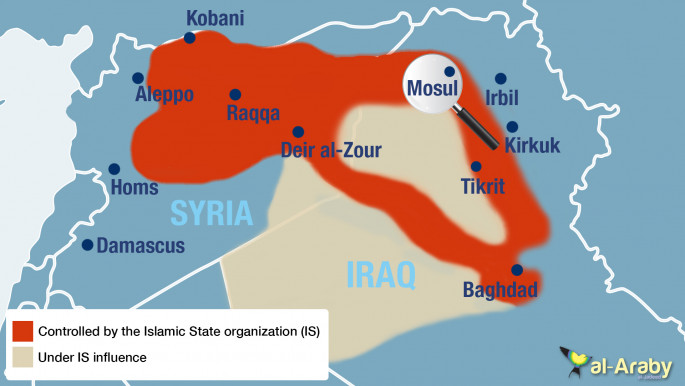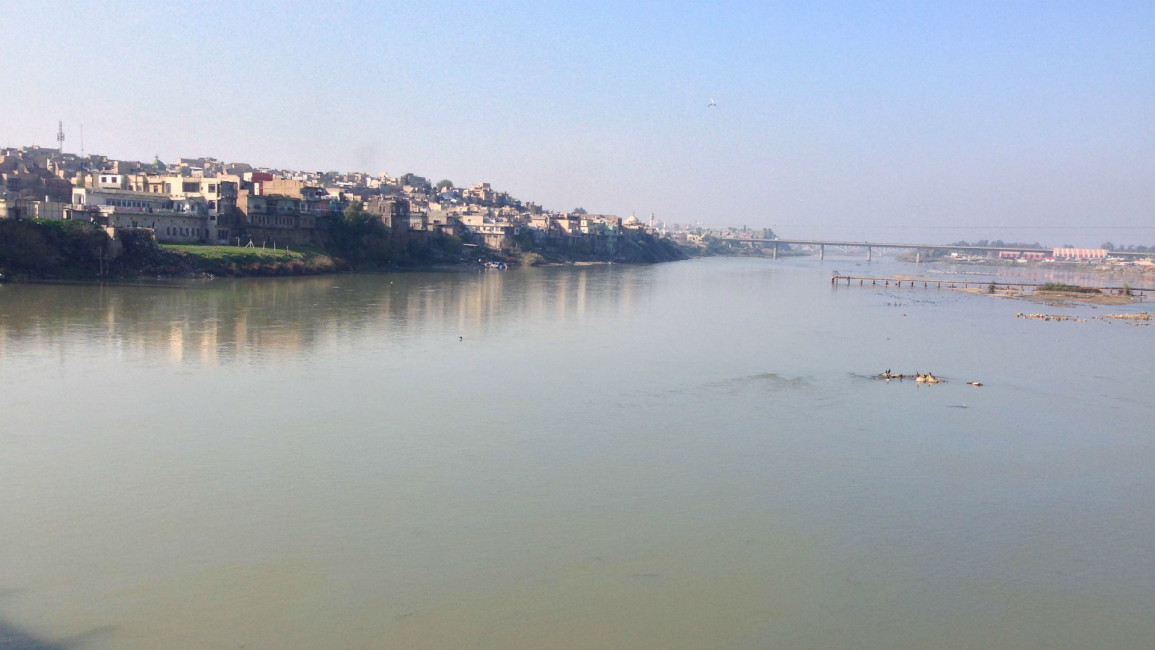
A journey to world's end
The flags are everywhere. So are the scars. And those who remain are exclusively the poor, those without the means to flee, to Turkey or Europe. Anywhere but here.
Raqqa is a city whose citizens are doomed to misery. "The Islamic State took Raqqa with many sacrifices," one IS fighter told me. "We will never leave."
Experts around the world wonder how the group secures
| Bashar shells us in the daylight. The coalition bombs us at night. - Abu Ali |
people's support. That is a complex matrix maybe only a rocket can solve. And there are no end of rockets in Raqqa.
US-led coalition airstrikes have done little but pile on the misery. So have Syrian government airstrikes. In late November, 10 airstrikes from Syrian planes hit the city, targeting its al-Hani mosque. At least 95 people died. Of those, lucky were the ones whose bodies were left intact.
Al-Hani's minaret was reduced to rubble, but the rest survived. So did Abu Fadel who sat alone in the mosque. "No one is here," he cried. "Only me."
Saleh, a young fighter, joined the anti-Islamist opposition force Thuwar ar-Raqqa in 2012. He fought many battles with government forces. He fought many others with IS. In one, he was injured. A finger was severed from his hand. His group abandoned him. He made his way, alone, to Turkey for medical attention.
Now he lives with a friend. He is in hiding. He waits for an offer from the IS. To repent. To join.
By contrast, when Abed, 26, was injured fighting for IS in Kobane, they took him straight to the hospital in Raqqa. He was treated and sent home to recover. He was given money.
Why are people getting radicalised? When misery surrounds you, suicide is an option. So is joining the IS. A cat in a corner will do anything to survive.
Crossing Syria
 |
"Bashar shells us in the daylight," said Abu Ali, an elderly man I met at the Bab al-Salamah border crossing with Turkey. "The coalition bombs us at night."
Abu Ali is a friendly sort. We talked about the misery here. He asked my why I was going to Mosul. I said I was going on business. He offered advice, how to stay clear of conmen. To him, it seemed, I was a young amateur, in need of wise counsel.
Five minutes later he was dead. Syrian regime aircraft bombed the bus station where we had been waiting, just after I left. Two of his sons were injured. Ten others died.
The roads to Iraq are all blocked. Only one, a narrow, previously abandoned road, snakes its way east. There is little life around this road, in this open bleak desert landscape, only columns of black smoke and the smell of crude in Kherbat Tamer and its surrounding villages. The people here live in mud and survive on oil they refine themselves.
"If it weren't for these primitive methods, people would die in the cold. There'd be no transit traffic. There'd be nothing," said Muhammad, a student and temporary travel companion. He shrugged off my concern. "I think there are more urgent priorities than preserving the environment."
Abdul Rahman disagreed. He showed his hands, diseased and damaged from exposure to oil derivatives.
The drive through the desert is hundreds of kilometres before we reach Shadaddi town. This is the IS group's most important stronghold in the Hasakeh province of northeastern Syria. It is where fierce clashes first broke out between IS and the Nusra Front.
The prize? Shadaddi is surrounded by developed oil fields. It has become the hub of the IS group's oil industry. It is also the seat of its foreign fighters.
The Sykes-Picot border
Shadaddi is about 50km from the Iraqi border. But there is no border any longer. The former guard posts and government houses are flattened. It is the clearest example of the shock to the established order of the region that the IS has caused. It is one the group has been keen to promote.
Hence the footage in June of IS spokesman Abu Mohammad al-Adnani with the powerful IS leader Omar al-Shishani driving a bulldozer over the border; a bulldozer through Sykes-Picot.
The crossing is now a humble and bumpy road between two wilayas, the provinces of Nineveh and Baraka.
Beyond it are the Sinjar Mountains. Driving 30km along this range proved less dangerous than I had feared. It was here that the IS pushed Yazidis up the mountains, away from their villages. Houses lie deserted at the side of the road.
Armed Yazidis still come down at night, I am told, to check on their deserted property, even at the risk of clashes with IS fighters. The road is closed after 8pm.
Constant tension is the daily headline to the story of this area.
In Shingal town, also known as Sinjar, there is nothing left. Here, in August, IS fighters battled and beat Kurdish peshmerga forces, causing an exodus of the town's population, especially from the Yazidi minority. Some reports suggested as many as 500 Yazidis – whom IS have labelled 'devil worshippers' – were killed here.
Sunnis also fled the town when it came under bombardment by Kurdish forces after the IS take-over. Only a few stayed. But the fighting has died down now. The black flag of IS flutters over the town's main roundabout. Destroyed houses litter the sides of its roads, testament to this conflict at its core: a pure sectarian, ethnic war.
My Iraqi companion recalled how it used to be different. How Sunni and Shia Turkmen all lived in Tel Afar, just a few kilometres east of Shingal, how being Shia or Sunni didn't matter.
 |
|
| At night, the streets of Mosul are deserted (Hisham) |
It changed. Now Turkmen fight each other, Sunni against Shia. The sectarian flame has been lit. Now, Tel Afar is the IS group's headquarters in Nineveh. Here, coalition aircraft bomb every night. Aircraft that were called in after the Yazidis were pushed up the Sinjar Mountains.
Mosul
In Iraqi Sunni eyes, the coalition strikes on the IS group is not a war against extremism, it is a war against Sunnis. On the ground, the fight against IS is led by hard-line Shia militias.
To residents of Mosul, the IS is the only option. They look south, at Anbar Province, where Sunni tribes fighting the IS are left to their own devices by a central government that only on paper is an ally in the same fight. Those tribes alone will pay the price. Hundreds of members of the Abu Nimer tribe were slaughtered in the most brutal manner by IS near Ramadi, the capital of Anbar.
But on the other side of the Euphrates River, Shia militias like al-Hash al-Shaabi, which has been linked with Nouri al-Maliki, the former Iraqi prime minister, exact terrible vengeance on Sunnis in that part of Ramadi.
In Mosul, the conclusion is simple. They must stick to the IS or be humiliated by what they see as a Shia Iraqi army. Mosul is a beautiful ancient city. It must survive this ordeal.
When I arrived, the sun was rising on the city. It's winter. It's been raining all night. At eight, the city is back to life, noisy, bustling. This is a city of survivors. In the day, it is a city for those who embrace life even when it rejects them.
At night it is different. The streets are empty. The lights go out. The IS patrols come out.
They say there were other groups here that were instrumental in kicking out the army last year. The Naqishbandi Army is always mentioned, an awkward mix of Sufism and Baathist nationalism. The Naqishbandi played an instrumental role in pushing out the Iraqi army, they say.
That cleared the way for the IS. And there is no sign of the Naqishbandi now. No flag, not even a tattered one. No sign, not a slogan on a wall. If they were there they have evaporated now.
"There was IS and only IS," said Abu Ahmed, a 60-year-old. But Omar, not far away on Farouq Street disagreed. He told me he personally knew some of its members. Some of them were his neighbours. They have fled, an analyst I asked said. They've sought refuge in the countryside.
And IS has a large appetite. Swallowing rivals is one of its favourite pastimes. I asked one IS fighters what happened to the Naqishbandi. Most of them, he said, gave ‘Bayah' and swore loyalty to the "caliphate".
Preparing for battle
 |
The peshmerga are closing in. Being on the defensive is a new reality for the IS. The Iraqi army wants to return. Will they retake Mosul? Not yet. Not for a while.
Iraq's prime minister, Haidar al-Abadi, talks of an offensive to retake Mosul. Atheel al-Nojaifi, Nineveh's governor, flies to the US, pleads with Washington. Arm the Sunni tribes. Take back Mosul.
In Mosul, residents fear the worst. Like Raqqalians, Mosulians are trapped, with only narrow range of unappealing options – if they had a choice.
If they had a choice? Husam, a taxi driver pauses. He is glad, he said, that the Iraqi army is out. But he misses some services.
Choice? Why is it always between an abusive army offering services and a fundamentalist group destroying public life?
Life in Mosul can deceive you. But sit with people, and they will start to complain. The lack of public services and the uncertainty over the future are the immediate complaints. It is just like in Raqqa. It is worse in Raqqa. When residents of Mosul visit Raqqa they feel some relief. "Thank God. It could be worse," said Mahmoud, turning to his cousin, Yahiya.
Cousins, they are the most unfortunate passport holders I've ever met. An Iraqi and a Syrian who visit their second countries for the first time ever as they are joined in union (for how long?) by this "caliphate".
Pain and the IS join Raqqa and Mosul, cities of pain, on the dark side of the earth.



